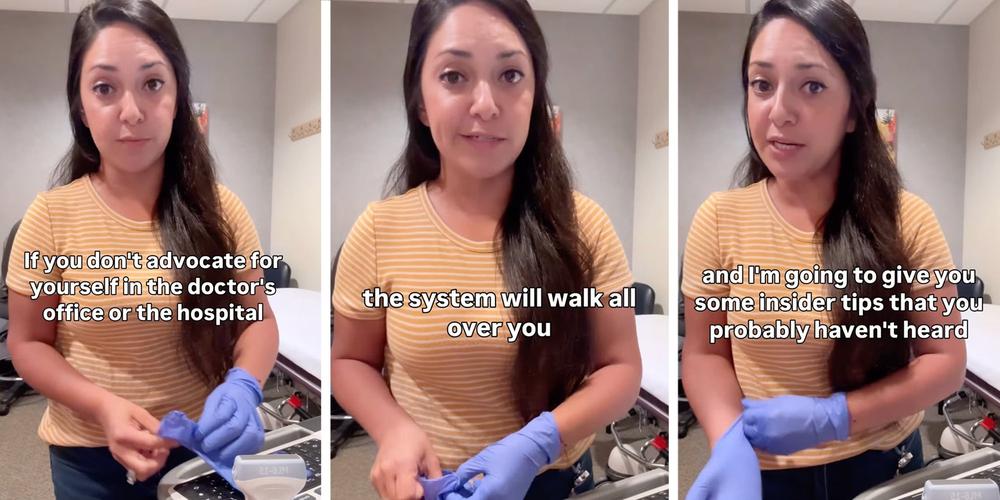Jasmine, an ultrasound tech and wellness creator known as @jazzzyyy13, says most patients don’t realize how vulnerable they are in medical settings until it’s too late. In a viral Instagram reel, she outlined five insider tips for self-advocacy, strategies she argues can help patients avoid being dismissed or funneled into unnecessary procedures.
Featured Video“If you don’t know how to advocate for yourself, you’ll get rushed, dismissed, and sometimes even denied care you actually need,” she wrote in the post’s caption.
The Aug. 31, 2025, reel racked up over 322,000 likes on Instagram and was shared by @soulprovacateur on X, where it reached over 800,000 views. The resulting conversation revealed that people have different perspectives on the role of medical professionals and the healthcare industry.
AdvertisementSome commenters who responded to Jasmine’s tips took issue with the implication that doctors do not have patients’ best interests in mind. Those with less faith in the healthcare system, and many who shared stories about traumatic experiences with serious illness, agreed that aggressive self-advocacy impacts care.
“Don’t you find it disturbing that you have to teach people to know these things in order to protect themselves from our healthcare system? Wild.”
5 self-advocacy tips that go beyond the basics
Jasmine said, if you haven’t heard these tips before, it’s because they aren’t “the basic ‘bring a list of questions’ tips.” Her advice for self-advocacy in a medical setting comes from working within the system.
Advertisement“These aren’t the typical surface-level tips,” she said. “These are ones that protect you from being rushed, silenced, or taken advantage of.”
- Create accountability by requesting your doctor logs everything in your chart. Ask healthcare pros to note their responses and refusals to your questions in your chart so that there’s a record of how your treatment plan evolved.
- Slow down. Jasmine said the healthcare system is built to process patients with speed. She suggests you say something like, “I’m not ready to move on yet, I have more questions,” to deter doctors from rushing.
- Bring a friend or family member. “Always try to bring a second set of ears,” so you’re less likely to miss details. If you’re alone, ask permission to record the consultation on your phone.
- Pay attention to the language your doctor uses. “When they say this is a standard protocol, ask, is this required or is it optional? Those words matter,” said Jasmine. “Optional means you have a choice. Standard protocol doesn’t always mean it’s what’s best for you.”
- Insist on a full explanation of alternatives and risks. Jasmine points out that doctors are trained to present care plans as inevitable progressive next steps, but patients have a right to information about options and potential outcomes.
Nurses and former patients praise the reel’s practicality
Nurses and other medical industry pros in the comments thanked Jasmine for the relevant tips. Others commented that self advocacy (and the healthcare system) is more complicated. They asserted that doctors are not out to get you.
Advertisement“As a retired nurse I agree with everything she said. You must have an advocate with you when going to the doctor and especially when being admitted in a hospital.”
“After working for 42 years in healthcare, this post is worth its weight in gold!!! Thank you so much!”
Advertisement“I was a medical malpractice lawyer 25 years ago and I can assure you this is GREAT ADVICE 🙏 … hospitals and healthcare ‘professionals’ kill patients every day.”
“These are good tips but it’s a shame it’s framed as though doctors or the medical system are out to get you, which is not the case. The speed is due to time constraints and number of patients needing to be seen.”
Advertisement“These are all great tips but the framing is terrible. No one is out to get you or take advantage of you… If you present yourself as an adversary to your doctor you will get worse care – they will want to spend less time with you and will start ordering tests and prescribing meds that aren’t indicated or helpful just to avoid having to deal with you.”
Jasmine, @jazzzyyy13, did not immediately reply to the Daily Dot’s request for comment via Instagram.
The internet is chaotic—but we’ll break it down for you in one daily email. Sign up for the Daily Dot’s newsletter here.

 Il robot aspirapolvere lavapavimenti che usa le stesse tubature della lavatrice. È il concept di Roborock
Il robot aspirapolvere lavapavimenti che usa le stesse tubature della lavatrice. È il concept di Roborock